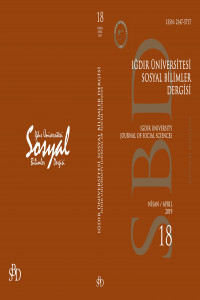Abstract
Sosyal bilimlerin birçok alanında haklı bir bilgi birikimine sahip Hilmi Yavuz’un şiirlerinde bu geniş irfanın izlerine rastlanır. İki düzlemde okunması gereken şiirlerinde yüzeysel anlamın altında kendini sezdiren farklı anlam katmanları bulunmaktadır. İmgeci bir şair olarak tanınan Yavuz, özellikle istiarelerden yararlanarak ördüğü şiirlerinde bol çağrışımlı anlamlara başvurur. Bu çalışmada, Riffaterre’in göstergebilimsel yöntemleri yardımıyla çözümlemeye çalıştığımız “doğu şiirleri” hem anlam derinliği hem de estetik incelikleri itibariyle bir yakın okumaya tabi tutulmuştur. Doğu uygarlığının kendi paradigmatik dizgesi genel bir çerçevede verilerek Doğu Anadolu’nun kültürel ve sosyolojik nitelikleri şiirin elverdiği imkânlar ölçüsünde iletilmeye çalışılmıştır. Şiirin yazıldığı dönemde Türk şiirine hâkim olan toplumcu anlayışın paralelinde olan fakat etkisinde kalmayan bu şiirlerde kolektif meseleler, bireysel duyarlılıklar ihmal edilmeden işlenmiştir. On sekiz şiirden oluşan doğu şiirleri, şairin felsefi, tarihi, iktisadi, sosyal ve siyasal bakış açısının aynasında görünen Doğu imgesini yakalamaya yönelik gayretinin bir sonucudur.
Keywords
References
- Akün, Ömer Faruk, “Divan Edebiyatı”, TDV İslam Ansiklopedisi, C. 9
- Andrews, Walter G., (2017). Şiirin Sesi, Toplumun Şarkısı, İletişim Yayınları, İstanbul.
- Bilgin, Nuri, (2013). Tarih ve Kolektif Bellek, Bağlam Yayınları, İstan- bul.
- Bozarslan, Mehmet Emin, (1966). Doğunun Sorunları, Şafak Kitabevi, Diyarbakır.
- Divitçioğlu, Sencer, (2015). Asya Üretim Tazı ve Osmanlı Toplumu, Alfa Basım Yayın, İstanbul.
- Eliade, Mircea, (2017). Ebedi Dönüş Miti, Dergâh Yayınları, İstanbul.
- Erekli, Arzu, (2014). “Hilmi Yavuz’un doğunun sevdaları Şiirinde Femi- nist Dönüşüm”, Örtmektir Yazmak Dediğim, Meserret Yayınları, İstanbul.
- Fırat, M. Şerif, (1998). Doğu İlleri ve Varto Tarihi, Kamer Yayınları, İstanbul.
- Friedman, Norman, (2004). İmge, Kitap-lık, (Sayı: 74), Yapı Kredi Ya- yınları, İstanbul.
- Fromm, Erich, (2008). Sevginin ve Şiddetin Kaynağı, Payel Yayınları, İstanbul.
- Giddens, Anthony, (2014). Modernite ve Bireysel Kimlik, Say Yayınla- rı, İstanbul.
- Halbwachs, Maurice, (2016). Hafızanın Toplumsal Çerçeveleri, Heretik Yayınları, Ankara.
- Heidegger, Martin, (2008). Düşüncenin Çağırdığı, Say Yayınları, İstan- bul.
- Klein, Janet, (2017). Hamidiye Alayları, İletişim Yayınları, İstanbul.
- Narlı, Mehmet, (2014). Şiir ve Mekân, Akçağ Yayınları, Ankara.
- Ocak, Ahmet Yaşar, “Fütüvvetname”, TDV İslam Ansiklopedisi, Cilt: 13
- Rıfat, Mehmet, (2013). XX. Yüzyılda Dilbilim ve Göstergebilim Kuram- ları, Yapı Kredi Yayınları, İstanbul.
- Riffaterre, Michael, (1984). Semiotics of Poetry, Indiana University Press, Bloomington.
- Sancar, Mithat, (2016). Geçmişle Hesaplaşma, İletişim Yayınları, İstan- bul.
- Sönmez, Mustafa, (1990). Doğu Anadolu’nun Hikâyesi, Arkadaş Yayı- nevi, Ankara.
- Temo, Selim, (2011). Türk Şiirinde Taşra, Agora Kitaplığı, İstanbul.
- Yavuz, Hilmi, (2012). Büyü’sün Yaz , Yapı Kredi Yayınları, İstanbul.
- Yavuz, Hilmi, (1987). Felsefe Üzerine Yazılar, Bağlam Yayınları, İstan- bul.
- Yavuz, Hilmi, (2010). Okuma Biçimleri, Timaş Yayınları, İstanbul.
- Yavuz, Hilmi, (1999). Şiir Henüz, Est&Non Yayınları, İstanbul.
- Yavuz, Hilmi, (1987). Yazın Üzerine, Bağlam Yayınları, İstanbul.
- Yiğitbaş, Maksut, (2008). Gülün Ustası Hilmi Yavuz, Karakutu Yayın- ları, İstanbul.
Abstract
In the poems of Hilmi Yavuz, who has the right knowledge in many fields of social sciences, the traces of this wide knowledge are found. In his poems, which must be read in two planes, there are different layers of meaning that perceive themselves under the superficial meaning. Yavuz who recognized as an imagist poet, especially in the use of metaphorical references to the poem in the associations of abundant associations. In this work, we try to analyze Riffaterre with the help of semiotic methods, doğu şiirleri The Eastern Poetry , were subjected to a close study in terms of both their depth of meaning and their aesthetic subtlety. Oriental civilization's own paradigmatic system was given in a general framework and the cultural and sociological qualities of Eastern Anatolia were tried to be conveyed to the extent that poetry was possible. In the period when poetry was written, in parallel with the socialist concept dominating Turkish poetry; but in these poems which are not influenced, the collective affairs are processed without neglecting individual sensitivities. The eastern poetry, consisting of eighteen poems, is the result of an effort to capture the eastern imagery that appears at the same time as the poet's philosophical, historical, economic, social and political point of view.
Keywords
References
- Akün, Ömer Faruk, “Divan Edebiyatı”, TDV İslam Ansiklopedisi, C. 9
- Andrews, Walter G., (2017). Şiirin Sesi, Toplumun Şarkısı, İletişim Yayınları, İstanbul.
- Bilgin, Nuri, (2013). Tarih ve Kolektif Bellek, Bağlam Yayınları, İstan- bul.
- Bozarslan, Mehmet Emin, (1966). Doğunun Sorunları, Şafak Kitabevi, Diyarbakır.
- Divitçioğlu, Sencer, (2015). Asya Üretim Tazı ve Osmanlı Toplumu, Alfa Basım Yayın, İstanbul.
- Eliade, Mircea, (2017). Ebedi Dönüş Miti, Dergâh Yayınları, İstanbul.
- Erekli, Arzu, (2014). “Hilmi Yavuz’un doğunun sevdaları Şiirinde Femi- nist Dönüşüm”, Örtmektir Yazmak Dediğim, Meserret Yayınları, İstanbul.
- Fırat, M. Şerif, (1998). Doğu İlleri ve Varto Tarihi, Kamer Yayınları, İstanbul.
- Friedman, Norman, (2004). İmge, Kitap-lık, (Sayı: 74), Yapı Kredi Ya- yınları, İstanbul.
- Fromm, Erich, (2008). Sevginin ve Şiddetin Kaynağı, Payel Yayınları, İstanbul.
- Giddens, Anthony, (2014). Modernite ve Bireysel Kimlik, Say Yayınla- rı, İstanbul.
- Halbwachs, Maurice, (2016). Hafızanın Toplumsal Çerçeveleri, Heretik Yayınları, Ankara.
- Heidegger, Martin, (2008). Düşüncenin Çağırdığı, Say Yayınları, İstan- bul.
- Klein, Janet, (2017). Hamidiye Alayları, İletişim Yayınları, İstanbul.
- Narlı, Mehmet, (2014). Şiir ve Mekân, Akçağ Yayınları, Ankara.
- Ocak, Ahmet Yaşar, “Fütüvvetname”, TDV İslam Ansiklopedisi, Cilt: 13
- Rıfat, Mehmet, (2013). XX. Yüzyılda Dilbilim ve Göstergebilim Kuram- ları, Yapı Kredi Yayınları, İstanbul.
- Riffaterre, Michael, (1984). Semiotics of Poetry, Indiana University Press, Bloomington.
- Sancar, Mithat, (2016). Geçmişle Hesaplaşma, İletişim Yayınları, İstan- bul.
- Sönmez, Mustafa, (1990). Doğu Anadolu’nun Hikâyesi, Arkadaş Yayı- nevi, Ankara.
- Temo, Selim, (2011). Türk Şiirinde Taşra, Agora Kitaplığı, İstanbul.
- Yavuz, Hilmi, (2012). Büyü’sün Yaz , Yapı Kredi Yayınları, İstanbul.
- Yavuz, Hilmi, (1987). Felsefe Üzerine Yazılar, Bağlam Yayınları, İstan- bul.
- Yavuz, Hilmi, (2010). Okuma Biçimleri, Timaş Yayınları, İstanbul.
- Yavuz, Hilmi, (1999). Şiir Henüz, Est&Non Yayınları, İstanbul.
- Yavuz, Hilmi, (1987). Yazın Üzerine, Bağlam Yayınları, İstanbul.
- Yiğitbaş, Maksut, (2008). Gülün Ustası Hilmi Yavuz, Karakutu Yayın- ları, İstanbul.
Details
| Primary Language | Turkish |
|---|---|
| Journal Section | Research Article |
| Authors | |
| Publication Date | April 1, 2019 |
| Published in Issue | Year 2019 Issue: 18 |


